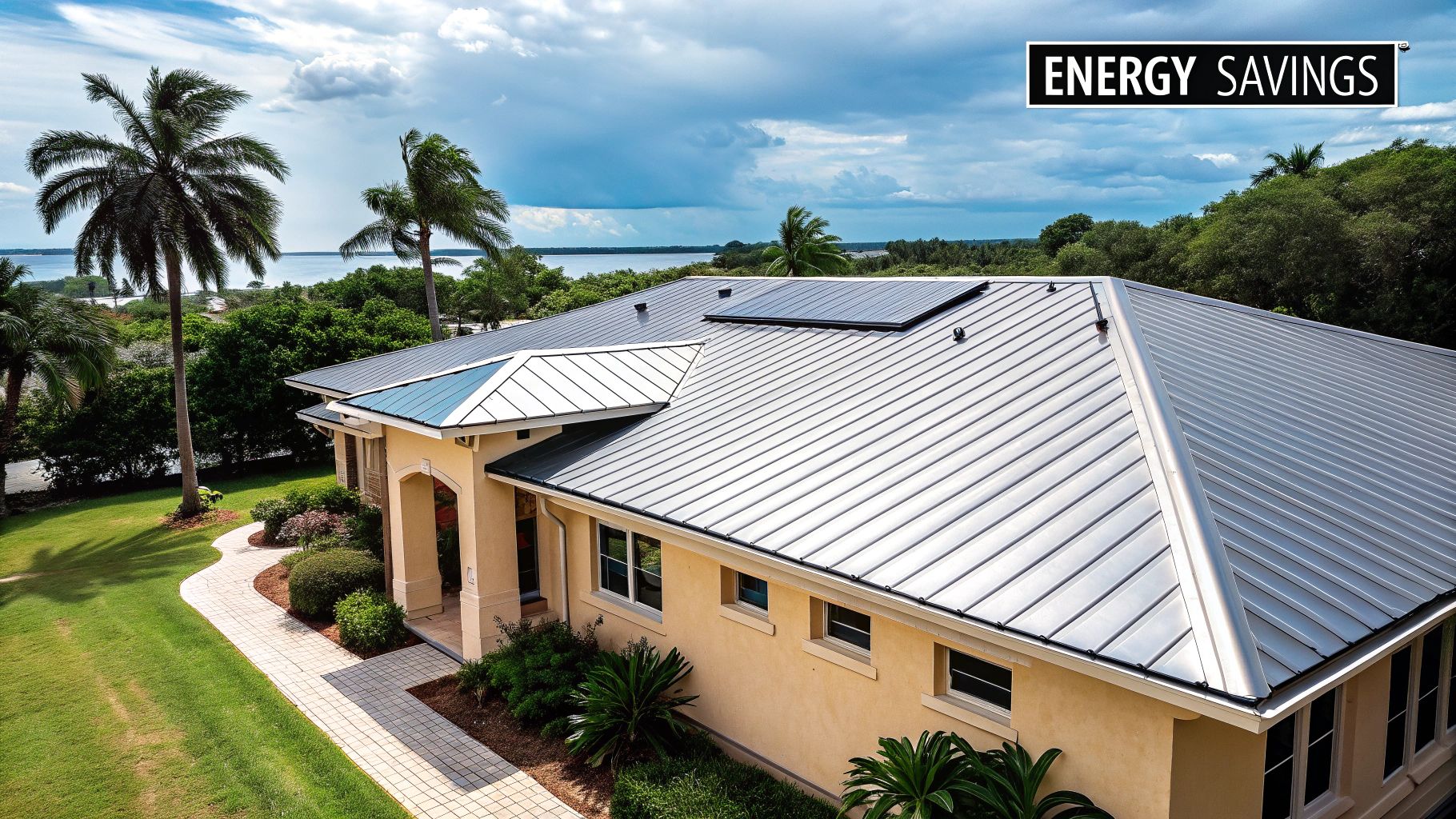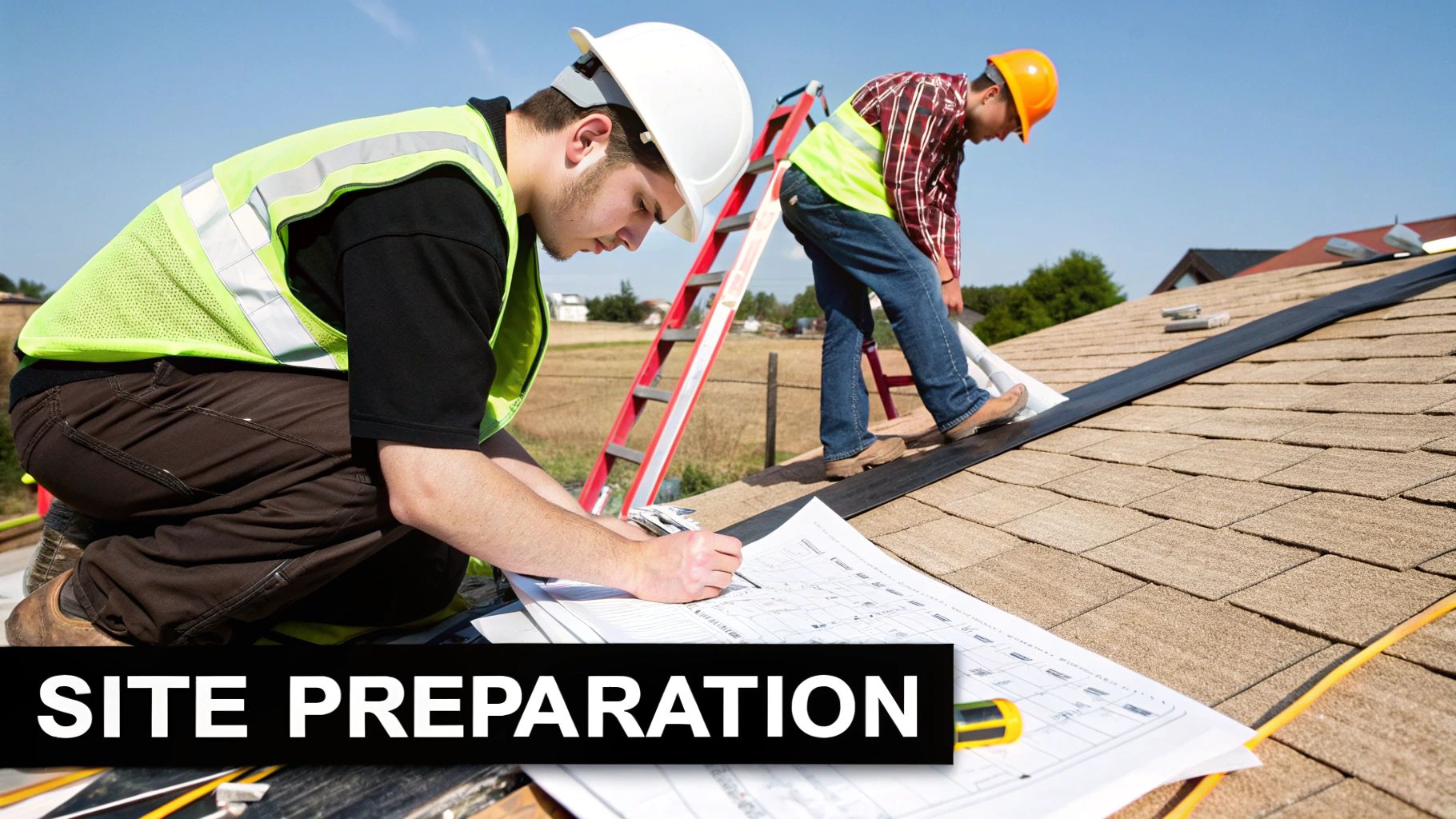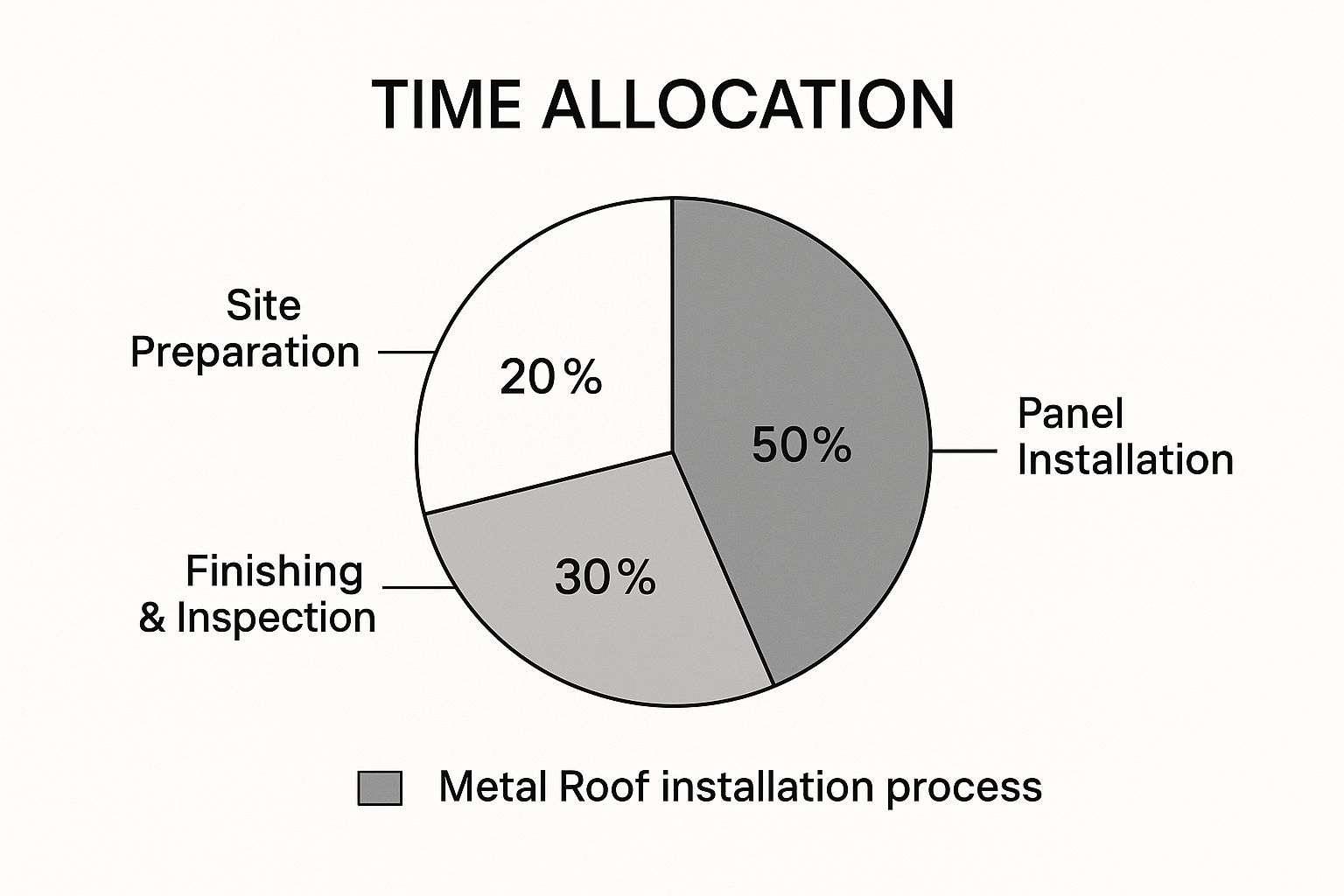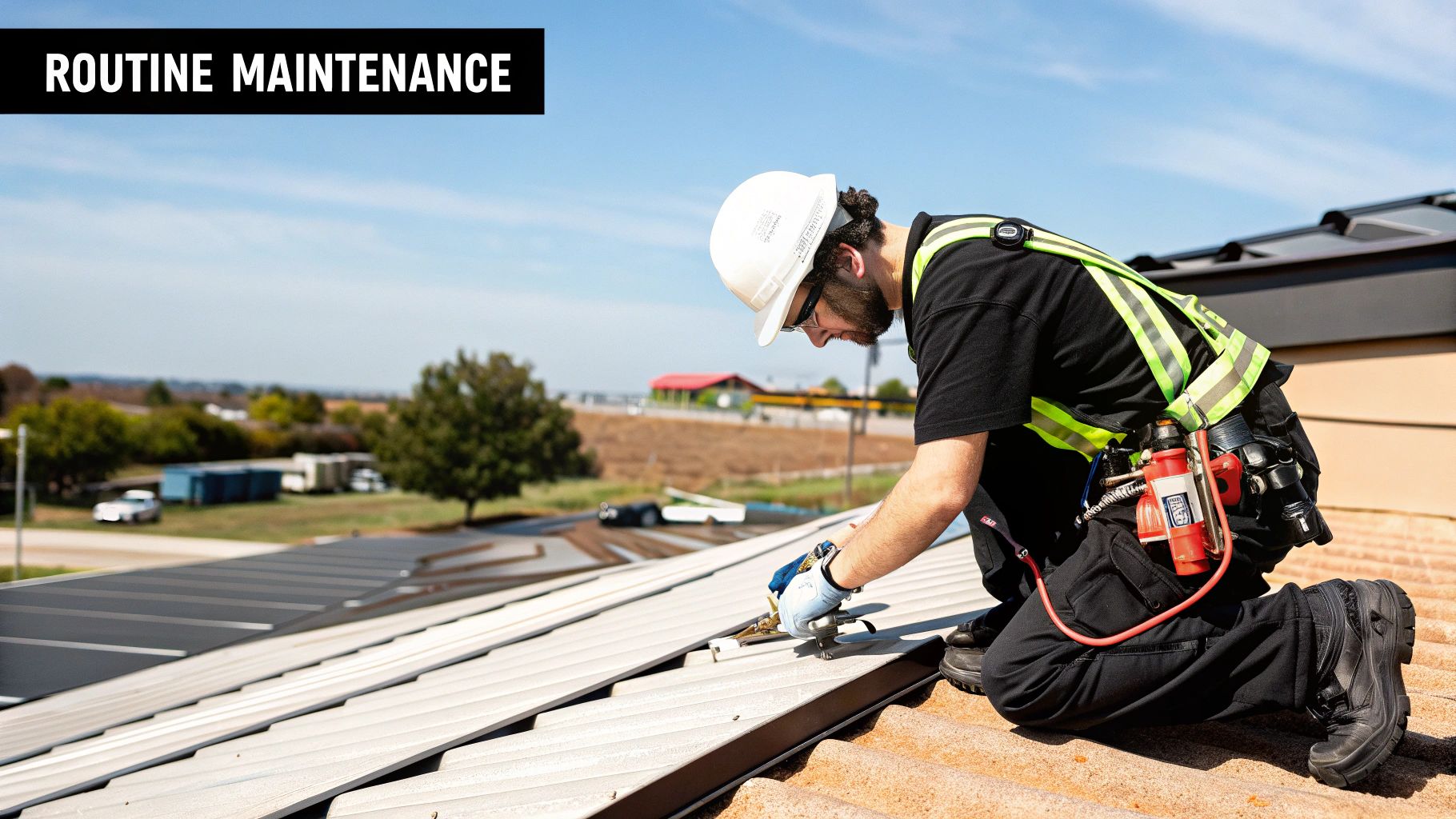A metal roof in Florida isn't just a roof—it's your home's first line of defense against our wild weather. It offers wind resistance and longevity that materials like asphalt shingles simply can't match, making it a go-to choice for homeowners looking for serious, long-term protection and a break on their insurance. This guide provides the actionable insights you need to make a smart, informed decision.
Why Metal Roofs Are a Smart Choice for Florida Homes
Choosing a new roof here in Florida goes way beyond curb appeal. It’s a huge decision that affects your family’s safety, your monthly energy bills, and how much you pay for homeowners insurance. Our climate is no joke—we’ve got blistering sun, thick humidity, and the ever-present threat of hurricanes. This calls for a roofing system that's built tough from the ground up.
This is exactly where metal roofing shines. It's not just an upgrade; it’s a smart investment in your home's future.
For most homeowners, the decision process starts with sheer durability. We’ve all seen what a bad storm can do to an asphalt shingle roof—curled edges, cracked tiles, and whole sections peeled back by high winds. Metal roofing systems, on the other hand, are engineered to take a beating and stay put.
Built for Florida's Toughest Weather
The shift toward metal roofing is a direct response to Florida’s hurricane seasons. After every major storm, you see more and more communities making the switch to materials that can handle those hurricane-force winds.
Nationwide, metal roofing now claims a 17% market share, which is a massive leap from just 3% a decade ago. Here in the South, an incredible 81% of roofing contractors expect that number to keep climbing, and it's all because of our weather and tougher building codes.
Actionable Takeaway: When getting quotes, specifically ask about the wind-uplift rating of the proposed metal panels. A professionally installed system with interlocking panels and heavy-duty fasteners is designed to fight wind uplift—a non-negotiable feature when you're staring down a hurricane.
More Than Just Storm Protection
A metal roof is about more than just surviving the next big storm. The financial upsides are what really get homeowners excited. Here is the actionable data you need.
- Soaring Insurance Costs: Action Step: Call your insurance agent before you choose a roof. Ask them what specific roof features will earn you the highest wind mitigation discounts. Metal systems almost always qualify, and those savings can help offset the initial cost over the life of the roof.
- Crushing Energy Bills: This is where "cool roof" technology becomes your best friend. Modern metal roofs have reflective coatings that literally bounce solar heat away from your house. This simple feature can slash your cooling costs by up to 25%, making those long, hot summers a lot more comfortable and affordable.
- True Long-Term Value: While the upfront investment is higher, a metal roof can last 50 years or more. That's two or even three times longer than a typical asphalt roof. When you factor in the energy and insurance savings, you get a fantastic return on investment and a serious boost to your home's resale value. Just look at the clean, modern aesthetic it gives this beautiful Florida home with a new metal roof.
Mastering Florida's Building Codes and Permits

Let's be honest: dealing with building codes and permits is the least exciting part of getting a new roof. For most homeowners planning a metal roof installation in Florida, it's a maze of paperwork and rules that can feel intimidating.
But here’s your action plan—this process is absolutely non-negotiable. It’s there to protect your home, your investment, and your family.
Florida's building codes, particularly in coastal areas, are some of the toughest in the country for a very good reason. They’re written to make sure your new roof can take a beating from hurricane-force winds and relentless rain. Trying to sidestep these rules isn't just a bad idea; it can lead to failed inspections, having to tear the whole thing off, and even getting your homeowner's insurance voided.
Understanding the Key Paperwork
Before your contractor lays a single panel, they must pull a permit. This isn't just a piece of paper; it’s the official green light that ensures your project is done by the book. One of the first documents you'll hear about is the Notice of Commencement (NOC).
Think of the NOC as a public announcement that work is officially starting on your property. It clearly states who the homeowner is, who the contractor is, and the address. Most importantly, it protects you. If your main contractor doesn't pay their suppliers or subcontractors, the NOC prevents them from putting a lien on your house.
Action Step: Your contractor files the NOC, but it is your responsibility as the homeowner to verify that it's posted somewhere visible on-site before work begins. This simple act is your number one defense against surprise legal and financial problems. Do not let work start without it.
What to Expect During Roof Inspections
Once work begins, an inspector will visit the site at key stages. These are essential quality control checks by a neutral expert whose only job is to confirm that the installation meets the strict standards of the Florida Building Code.
Here is what you need to know about the inspections they will perform:
- Dry-In Inspection: Before the metal panels go on, the inspector checks the roof deck for rot and verifies the underlayment—your roof's waterproof barrier—is installed perfectly, with the correct nailing pattern and sealed seams.
- In-Progress (or Mid-Roof) Inspection: For a metal roof, this is all about the fasteners. The inspector ensures the crew is using the correct number of approved screws per panel. This detail is crucial for resisting wind uplift.
- Final Inspection: When the job is done, the inspector returns to check flashing, the drip edge, and the overall quality to sign off that the entire system is sealed and complete.
Passing these inspections is a huge milestone. It’s official confirmation that your metal roof installation in Florida was done right, and you'll get a certificate of completion to prove it. Action Step: Keep this certificate in a safe place. You will need it for insurance purposes and when you sell your home.
The Real-World Impact of Compliance
It's easy to see how things can go wrong if a roofer cuts corners. Maybe they use fewer screws than required or a cheaper underlayment that isn't up to code. The roof might look okay from your yard, but it’s a time bomb. The next time a hurricane spins up, that roof will be the first to fail.
This is exactly what the permit and inspection process is designed to stop. Following the rules isn’t about jumping through hoops for the city. It’s about making sure your roof does its job when you need it most.
Understanding the True Cost of a Metal Roof in Florida

The final price tag for a metal roof installation in Florida isn’t just one number; it’s a combination of several important factors that you, the homeowner, have control over. Understanding these variables is key to setting a realistic budget.
While the initial investment is higher than traditional asphalt shingles, we need to look at exactly what you’re paying for and the significant returns you'll see over the long haul.
Breaking Down the Upfront Investment
The first thing that will move the needle on your quote is the type of metal and panel profile you choose. A standing seam metal roof, with its clean lines and concealed fasteners, almost always costs more than a 5V-crimp or corrugated panel system because the installation is far more intricate and time-consuming.
Likewise, the material itself plays a huge role. Aluminum is often the go-to for coastal homes because it's naturally rust-proof, but it comes at a premium. Galvalume-coated steel offers excellent protection at a more moderate price point, making it a popular choice for inland properties.
Budgeting Insight: The average cost for installing a metal roof in a city like Orlando is around $16,021. Most homeowners can expect to pay somewhere between $8,084 and $24,891. Labor is a big chunk of that, running from $4 to $8 per square foot, which is higher than other roofing materials because of the specialized skills needed.
Another major factor? The complexity of your roof. A simple, single-story gable roof is far less expensive to work on than a multi-level roof with dormers, valleys, and steep pitches. Each feature requires custom cutting and flashing, which adds to material and labor costs.
To give you a clearer idea, here's a look at how the budget for a typical Central Florida home might break down.
Sample Florida Metal Roof Cost Breakdown (2000 sq ft home)
| Expense Item | Estimated Cost Range | Key Considerations |
|---|---|---|
| Metal Panels & Materials | $7,000 – $12,000 | Varies by material (Aluminum vs. Steel) and profile (Standing Seam vs. 5V-Crimp). |
| Labor & Installation | $8,000 – $16,000 | Increases with roof complexity, pitch, and the need for specialized equipment. |
| Underlayment & Fasteners | $1,000 – $2,500 | High-temp, self-adhering underlayment is critical in Florida and costs more. |
| Permits & Inspections | $500 – $1,500 | Dependent on your local municipality's fee structure. |
| Dumpster & Debris Removal | $400 – $800 | Cost for removing the old roof and any construction waste. |
| Contingency Fund (10%) | $1,700 – $3,300 | Smart to budget for unexpected issues like rotted decking. |
| Total Estimated Cost | $18,600 – $36,100 |
This table shows that while materials are a significant expense, labor and associated costs make up a huge portion of the final price. It's why getting a detailed, itemized quote is so important.
The Real Return on Investment
While the initial price is a key part of the conversation, the true value of a metal roof really shines over time. This isn't just an expense; it’s a long-term investment that pays you back.
The most immediate return often comes from your homeowners insurance. Many Florida insurance carriers offer substantial discounts for homes with certified wind-resistant roofing systems. A properly installed metal roof almost always qualifies for the highest level of savings after a wind mitigation inspection.
Then there are the energy savings. Modern metal roofs with "cool roof" coatings are highly reflective, bouncing the sun's harsh UV rays away from your home. This simple act of reflection can slash your cooling costs by as much as 25%.
Here’s a quick rundown of the paybacks:
- Insurance Discounts: Your premium could drop significantly once a wind mitigation inspection verifies the roof's superior wind resistance.
- Energy Efficiency: Those reflective coatings mean lower monthly air conditioning bills.
- Increased Home Value: A durable, long-lasting metal roof is a major selling point, boosting your home’s resale value by up to 6%.
- Longevity: With a lifespan of 50+ years, you avoid the recurring cost of replacing an asphalt roof every 15-20 years.
Financing Your Florida Roof Installation
We know the upfront cost can be a hurdle. The good news is there are smart ways to manage it. Since you're making a long-term investment in your home, it's worth looking into financing approaches that make the project more affordable. A good place to start is to explore home equity loan and HELOC options.
These financial tools let you use your home's equity to fund an upgrade that not only protects your property but also enhances its value. By planning your budget and exploring your options, you can make a new metal roof an affordable reality.
Selecting the Right Metal Materials for Florida's Climate
When it comes to your metal roof installation in Florida, picking the right material is easily the most important call you'll make. It’s not just about color or style. It’s about choosing a system that can handle everything our climate throws at it—scorching sun, relentless humidity, and corrosive salt air.
Get it right, and you’ve got a roof for life. Get it wrong, and you’re looking at premature rust, fading, and costly headaches down the road. You must match the metal to your specific location.
This chart breaks down where the time goes on a typical installation. It really puts things into perspective.

As you can see, a full 50% of the project is just dedicated to laying the panels. That’s a massive chunk of time and labor, which really drives home why you must be confident in your material choice from day one.
The Great Material Debate: Coastal vs. Inland
For most Florida homeowners, the choice boils down to two heavy hitters: aluminum and Galvalume-coated steel. The deciding factor? Your zip code’s proximity to saltwater.
If you are within a mile or two of the coast, aluminum is the only material you should consider. It’s naturally rust-proof, so the corrosive salt spray that damages other metals won’t touch it. Yes, it’s a bigger investment upfront, but it buys you total peace of mind against the rust that can plague steel roofs in a marine environment.
For homes tucked away further inland, Galvalume-coated steel is a brilliant and more budget-friendly choice. It’s a tough carbon steel base protected by a zinc and aluminum alloy coating. This gives it fantastic corrosion resistance that's more than enough for areas away from the direct assault of salt air.
Actionable Warning: I’ve seen it happen: a contractor uses Galvalume on a beach house to save the homeowner a few dollars. Within five years, rust starts creeping in from the cut edges where the steel core was exposed. The entire roof is compromised, all because the wrong material was used. Do not let this happen to you.
To make this decision easier, here’s a quick breakdown of the most common options for our climate.
Comparing Metal Roofing Materials for Florida Homes
This table offers a side-by-side look at the metals we trust for Florida homes, helping you weigh the pros and cons based on where you live and what you’re looking for in a roof.
| Material Type | Best For | Average Lifespan | Corrosion Resistance |
|---|---|---|---|
| Aluminum | Coastal properties within a few miles of saltwater. | 50+ Years | Excellent (inherently rust-proof) |
| Galvalume Steel | Inland properties away from direct salt spray. | 40-60 Years | Very Good (protective zinc-aluminum coating) |
| Galvanized Steel (G-90) | Inland properties, sheds, or agricultural buildings. | 20-40 Years | Good (zinc coating only, less durable than Galvalume) |
| Copper | High-end custom homes anywhere in Florida. | 100+ Years | Excellent (develops a protective patina) |
Ultimately, the goal is to choose a material that won't just survive but thrive in your specific environment. For the vast majority of Floridians, that choice is between the coastal champion, Aluminum, and the inland workhorse, Galvalume.
Why Your Roof's Coating Is a Huge Deal
The raw metal is just one part of the equation. The finish—the paint that’s baked onto it—is just as vital under our brutal sun. Intense UV radiation will destroy inferior paint, causing it to fade, chalk, and peel.
Action Step: Insist on a Kynar 500 (also known as PVDF) finish in your contract. This is a high-performance coating specifically engineered to hold its color and resist UV degradation for decades. It's the industry standard for a reason: it flat-out works. Don't settle for anything less.
Panel Profiles and Performance
Finally, the shape of the panel affects more than just curb appeal; it's critical for wind resistance and keeping wind-driven rain out.
-
Standing Seam: This is the top-of-the-line system. The panels lock together with a raised, mechanically-seamed leg, and all fasteners are concealed and protected from the elements. This design offers incredible protection against hurricane-force wind uplift and is practically impenetrable to water.
-
5V-Crimp: You see this classic "Key West" look all over Florida. It’s an exposed fastener system, meaning the screws go through the face of the panel into the roof deck. It's a solid, durable profile, but those exposed fasteners can become weak points over time if they aren't installed with the right high-quality gasketed screws.
In a hurricane-prone state, the superior weather tightness and wind resistance of a standing seam roof provide the highest level of protection you can get. It's a more technical installation, but the long-term durability is second to none.
How to Hire a Qualified Florida Roofing Contractor
Let's be blunt: your brand-new metal roof is only as good as the crew that puts it on. You can have the best materials money can buy, but if the installation is sloppy, none of it matters. For a job as important as a metal roof installation in Florida, finding a qualified contractor isn't just a good idea—it's everything.
Trying to pick the right team can feel overwhelming. A quick search brings up dozens of companies. But if you know what to look for, you can cut through the noise and protect your investment.
Verifying Credentials The Right Way
Before you even think about getting a quote, your first step is to check a contractor's credentials. This is non-negotiable.
In Florida, any roofer you consider must be licensed by the state. Action Step: Go to the Florida Department of Business and Professional Regulation (DBPR) website and verify their license number is active and in good standing. An unlicensed roofer is a giant red flag.
Insurance is just as critical. A professional contractor will carry two key policies:
- General Liability Insurance: This protects your home from any damage the crew might cause.
- Workers' Compensation Insurance: This is an absolute must-have. It covers the contractor's employees if they get hurt on your property. Without it, you could be held liable for their medical bills.
Action Step: Do not just take their word for it. Ask them to have their insurance provider send you a current Certificate of Insurance (COI) directly. This is the only way to know for sure that their policies are active.
Asking The Insightful Questions
Once you’ve confirmed a contractor is licensed and insured, it’s time to dig deeper. The questions you ask now can tell you a lot about their real-world expertise with metal roofing.
A great question to start with is, "Are you certified by the manufacturer of the panels you're proposing?" This is a big one. Manufacturer certification means the crew has been specifically trained to install that product. In many cases, it's required to get the full material warranty.
Pro Tip: A contractor who has invested in manufacturer-specific training shows a real commitment to their craft. They know the small details that make a big difference—like the right fastening patterns and how to cut panels without damaging the protective coatings.
Here are a few more critical questions you should be asking:
- Can you show me your current workers’ compensation and liability insurance certificates? Asking directly for the documents forces them to provide real proof.
- Will you be using subcontractors on this project? You need to know exactly who is working on your roof and confirm that any subs are also properly insured.
- How do you handle surprises, like finding rotted decking? A pro will have a clear, written process for this involving a change order that you must approve before extra work is done.
- Do you have a portfolio of local metal roofs you've installed that I can see? A solid track record of completed projects in your area is a powerful sign of experience and a good community reputation.
Hiring a local company with a physical office is one of your best defenses against "storm chaser" scams. A local roofer cares about their reputation and will be around to honor their workmanship warranty, ensuring the

for years to come.
Common Questions About Florida Metal Roofs

Even after digging into the details, you probably have a few questions left. It’s a big decision for your home, and you should feel completely confident before moving forward. Let’s clear up some of the common myths and concerns we hear from Florida homeowners every day.
From worries about noise during our famous afternoon downpours to the real scoop on insurance savings, getting straight answers is key.
Will a Metal Roof Make My Florida Home Hotter?
No, the reality is the complete opposite. Modern metal roofs are one of the most energy-efficient choices you can make for a Florida home, thanks to special "cool roof" finishes.
These coatings are designed to be highly reflective. Instead of soaking up the intense solar heat like a dark asphalt shingle does, they bounce that radiation back into the atmosphere. The bottom line? You could see your cooling costs drop by as much as 25%.
On top of that, the way we install metal panels often creates a small air gap between the metal and the roof deck. This acts as a natural insulating barrier, stopping heat from ever reaching your attic.
Is a Metal Roof Noisy During Florida's Heavy Rain?
This is easily the biggest misconception out there. People picture an old tin roof on a barn and imagine a constant, loud pinging. That’s simply not the case for a modern residential installation.
In Florida, your metal roof is installed over a solid roof deck and a high-quality underlayment that provides an immediate sound buffer.
The Reality: When you factor in your attic insulation and the drywall of your ceiling, you have multiple layers of sound dampening. The result is a quiet, peaceful interior. Honestly, you won't notice any more noise than you would with a shingle or tile roof.
Can a Metal Roof Lower My Home Insurance in Florida?
Yes—and often by a significant amount. Florida insurance carriers are all about minimizing risk, and a properly installed metal roof makes your home much less of a liability. With superior, documented resistance to high winds and fire, insurers often pass those savings on to you with lower premiums.
The key to unlocking these discounts is getting a wind mitigation inspection right after your new roof is installed.
This report officially documents your home's hurricane-ready features for the insurance company, including:
- Roof-to-wall attachment strength
- The type of roof deck and how it's secured
- The wind-uplift rating of the metal panels
Action Step: Talk to your insurance agent before you sign a contract. They can explain their specific requirements and give you a solid estimate of the savings you can expect.
How Does a Metal Roof Stand Up to Hail and Salt Spray?
Metal is one of the toughest materials you can put on your roof. High-quality metal roofing systems typically earn a Class 4 impact rating—the highest rating possible. That means they can withstand hail up to two inches in diameter without failing.
For our coastal communities, salt spray is the real test. And this is where choosing the right material is non-negotiable.
Aluminum is the undisputed champion for coastal properties. It’s inherently rust-proof and won't corrode. If you live further inland, Galvalume-coated steel is an excellent, corrosion-resistant option. Just make sure your contractor properly seals any cut edges to prevent issues down the line.
Ready to invest in the lasting protection and value of a metal roof? The expert team at Exact Roofing has the experience and local knowledge to ensure your installation is done right, meeting Florida's strictest codes. Contact us today for a free, no-obligation consultation and secure your home for decades to come.

